
The Free Press

Nic Sumners, 20, lives outside Fredericksburg, Virginia, where he works as a cosmetic car repairman, repairing scratches and buffing vehicles. He makes about $24 an hour, more than three times the federal minimum wage, and often works overtime. And yet, Sumners can barely afford to stay afloat. A high school graduate raised by a single mother, Sumners lives in a mobile camper he purchased over the summer for $2,000.
“It’s nearly impossible,” he told me, listing off his monthly expenses including gas, food, electricity, and insurance. “By the end of the month that all costs more than what you bring in.”
For decades, the essence of the American dream has been to make enough money to raise a family, take an occasional vacation, and, especially, own a home. Sumners, who dreams of one day buying land to build a house on, thinks that for his generation, Gen Z, “There is no longer a promise for a white picket fence and a family like my grandparents were able to obtain.”
“Vacations,” he added, “a joke if you even mention it nowadays. My generation will be fighting to retire, if at all.”
Last spring, in an emotional TikTok video that quickly went viral, Sumners rendered his judgment: “The American dream is dead.”
Sumners is hardly alone in his fear that Gen Z will never attain the kind of middle-class life previous generations took for granted. In a Harvard Institute of Politics poll of Americans under 30, respondents listed inflation, healthcare, and housing as their top three national issues. A recent NBC poll of Gen Z voters found that 31 percent viewed “inflation and the cost of living” as their most pressing concern, beating out “threats to democracy,” “abortion,” and “climate change.”
Had Jace O’Malley, 22, been one of those polled, he would surely have been part of that 31 percent.
O’Malley enrolled at Texas State University in 2022, with plans to major in finance. But he decided to take this semester off in part to save some money on tuition. He’s working 30 to 40 hours a week as a landscaper while he rents out his San Marcos home, near campus, to three current students.
“In high school me and my mom set up a custodial account. With her help I invested money throughout high school, built up a little bit of funds to put a down payment on a property here in San Marcos that was a four bedroom, two bath,” O’Malley told me. “The idea was I was going to live in one room and then rent out the other three.”
But over the summer, O’Malley lost his mother. She left behind property in Kentucky that he, his brother, and father are now taking care of and paying taxes on. “It’s very stressful,” O’Malley said. Taking the semester off was not part of his plan, he said, but it felt necessary to keep up with rising costs. “I don’t see the hard work transitioning into anything.”

It is not unusual for the generation just out of college to worry that they’ll always be left behind by the previous generation. But this time, the millennials and Gen Zers who are struggling may well have a point. “I do think the frustrations of Gen Z, of millennials, of young people writ large, are warranted,” said Amalie Zinn, a research analyst for the Housing Finance Policy Center at the Urban Institute. Zinn, who’s just 24 herself, studies demographic factors in homeownership.
She noted that as millennials and Zoomers are reaching a point where they’re trying to live on their own or purchase their first home, “they’re seeing that home prices have increased to a degree that their incomes haven’t.”
This is partly because of the Federal Reserve’s policy of keeping interest rates high the last few years has also driven mortgage rates up, making it impossible for many potential buyers to afford the monthly mortgage payments. Other costs have shot up as well. The typical down payment for a first-time home buyer is eight percent, the highest in two decades, according to the National Association of Realtors. A third factor, though, is that there simply aren’t enough single-family homes for everyone who wants one—which has caused the price of a house to skyrocket. (The average price of a single-family home is currently $347,716.)
Indeed, according to the Congressional Research Service, the number of homes on the market per month has seen a staggering drop, from 4 million to 1.5 million. One big reason is that after the foreclosure crisis in 2008 and 2009, some big Wall Street firms began buying up vast quantities of homes that had always been owned by families or individuals in the past. Not surprisingly, because these investors only want renters, rental costs have risen nearly 22 percent since the pandemic.
Twenty-two-year-old Elizabeth Prophet, who’s pursuing a master’s degree in social work at the University of Chicago, told me that she scrambled to find an apartment to rent with her boyfriend, who’s struggling to find a job as an engineer. The couple, both recent graduates from the University of Alabama, found a one-bedroom apartment for “around $1,800 a month” in Hyde Park, but they’re having a hard time paying the bills. “With groceries on top of rent, we just don’t have enough money to go around,” Prophet said. They plan to enroll in SNAP benefits. “It’s really difficult because it just feels like so much of the money that I earn and will earn in a full-time job is going toward rent,” she said.
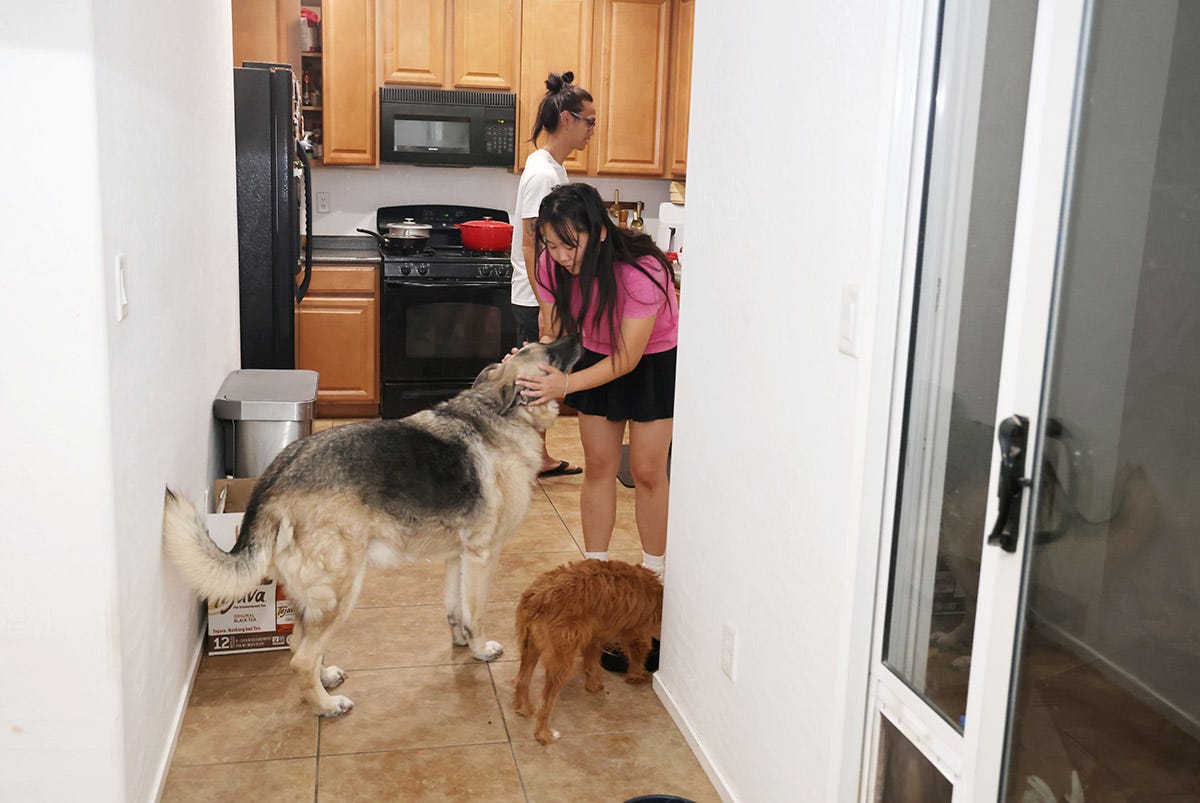
Even those who have been able to purchase a home have found that their experiences are a far cry from the vision of a two-car garage. When Mia Nakamura started dating Nick Tanuredjo, she didn’t plan to be living with him a mere six months later. Nakamura, then a student at University of Las Vegas, had just moved into a two-bedroom apartment with her mother to save money, but Tanuredjo—who had been living with his own mother—wanted to move in with her.
They quickly discovered that rental units were nearly impossible to find—and no wonder. Fifteen percent of single-family homes in Las Vegas have been bought by investors—and 25 percent in North Las Vegas, So, said Nakamura, the couple decided to buy a home together, ironically the more affordable option. Now, along with Nakamura’s mom, three dogs, and a cat, the couple lives in a 1,300-square-foot, three-bedroom house.
The house cost $335,000, and Tanuredjo put $20,000 on a down payment. Tanuredjo, who’s 30 and recently quit his job working at a local nonprofit to become a professional poker player, spent his entire life savings on their down payment. Before living in Las Vegas, he owned a wedding videography business in Ohio.
“Renting is more expensive than buying a house,” said Nakamura, who’s 23 and a communications coordinator for the nonprofit where she met her boyfriend. She makes $48,000 a year, she said. The couple, along with Nakamura’s mom—who pitches in with chores—split $2,200 per month for their mortgage. They also share utilities like gas, electricity, water, and Wi-Fi. When it came to shacking up and buying the house so soon, “Everyone thought we were crazy,” she said.
There are some 41 million members of Gen Z eligible to vote in November, and both candidates have offered proposals to make it easier for them to buy a home, and, more generally, help them with the cost of living.
Vice President Kamala Harris has announced a plan to support first-time home buyers with $25,000 toward their down payment. And the Republican Party platform, linked on Republican nominee Donald Trump’s website, promises to “reduce mortgage rates by slashing Inflation, open limited portions of Federal Lands to allow for new home construction, promote homeownership through Tax Incentives and support for first-time buyers, and cut unnecessary Regulations that raise housing costs.”
The Gen Zers I spoke to didn’t seem impressed. “If anybody could come up with a coherent plan, or even an idea on how it would get fixed, that is what I would look for,” Sumners said. “Fix where we’re at now: the homelessness crisis, immigration crisis, the debt crisis,” he told me, ticking off the issues he cares about in addition to housing and inflation. He voted for Trump in the Virginia primary election, but he isn’t sure he’ll vote for him in November, in part because he “cannot stand” Trump’s VP pick, J.D. Vance. (“He claims [to be a] local boy in Hillbilly Elegy, but he’s a graduate of Yale,” Sumners said.) As for Harris, Sumners wonders how her economic proposals will be financed, noting America’s $35 trillion in national debt.
Prophet, a self-described progressive, plans to vote for Harris, but doesn’t think her first-time home buyer proposal really addresses the root causes of the housing problem. “It is helpful that she’s thinking about it, but I think it needs to go further, because it sort of targets the people who are already looking to buy homes in the first place,” she said. When it comes to voters in her cohort, she said, “we’re not even considering buying homes because we can’t even afford to.”
O’Malley thinks he’ll vote for Trump, though he says his mind isn’t totally made up. “I’m open to hearing whatever [policies] work for the people,” he said. Asked about Harris’s plan to subsidize first-time home buyers with $25,000, O’Malley said he’s skeptical. “It’s the other stuff that adds up. . . if inflation keeps growing, if gas prices keep growing, you know, $25,000 for first-time homeowners would be awesome. I mean, that sounds great. But the taxes on that property are still going to be real high.”
New Hampshire state Rep. Joe Alexander, a 29 year-old Republican had perhaps the clearest understanding of the problem; he served as chairman of the House special committee on housing in the Granite State. “A student fresh out of college cannot afford to buy a single-family house for $600,000 and unfortunately, there’s no starter homes anymore. The starter homes used to be the single-family houses. But there’s a lack of townhouses, there’s a lack of apartments for sale, things like that,” Alexander said. “The ticket to the middle class and the ticket to a successful life is being able to buy and own your own home, and unfortunately, that’s really not attainable for people just coming out of college anymore.”
On the contrary, a Bloomberg / Harris Poll from 2023 showed that nearly half of young adults ages 18–29 live at home with their families, the highest percentage since the 1940s.
Xander Lemon is only 18, a student at Chandler-Gilbert Community College in Arizona, Yet even at his age, he’s worried about where he might be able to afford to live.
A few friends invited him to move into a shared house, but at the time he was making only $14.50 an hour as a fast-food worker at Cafe Rio. “If we were to split, they were asking for at least $800 and I know that’s not too, too expensive, but at the time with the job I had before this job, it was not doable.” Now, Lemon works part-time making $18 an hour as a behavioral health technician, in addition to his course load. He’s studying psychology.
Lemon wasn’t always planning to vote in November, but with his graduation on the horizon, he feels more of a pull toward the voting booth. He’s undecided, but “economics,” “the cost of living,” and “the cost of healthcare” are at the top of his list of priorities.
“I’m still doing research, still trying to figure out what is propaganda and what is clearly policy,” he said.
He told me he wants the “independence” that “all young people strive for.” “You know with me growing up, I think it’s time to fend for myself,” he said. Still, for now he’s living with his parents.
Rachel Janfaza is a journalist covering youth political culture, and she’s the founder of The Up and Up.
For more stories on Gen Z and the election, culture, and politics, become a paid subscriber:

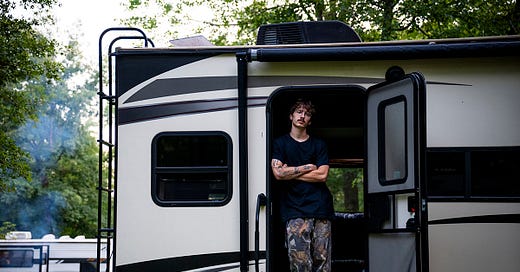

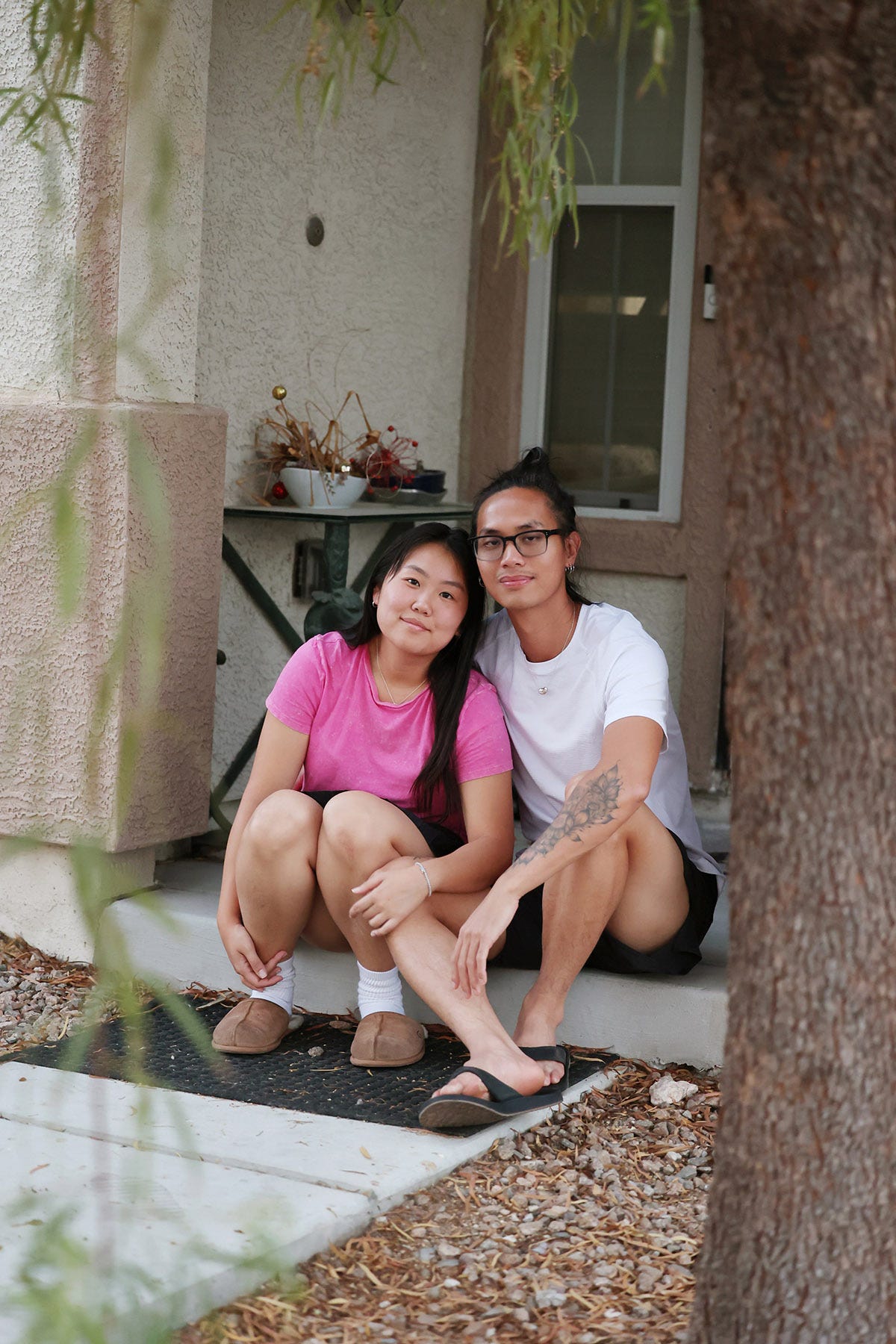




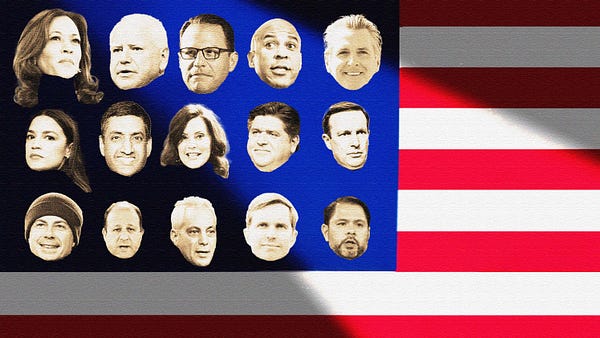





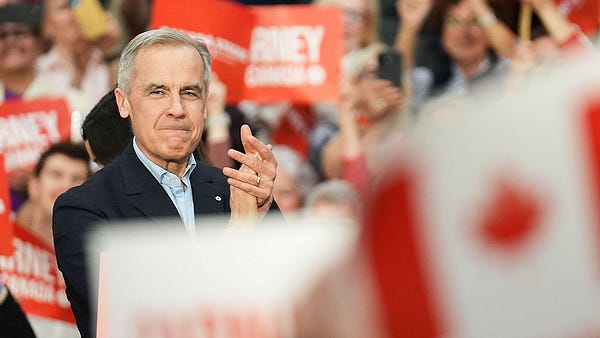

My parents got married in the mid-fifties. My father was in his mid thirties, my mother in her late twenties. They had been working since graduating from college, him in 1948 (his college had been interrupted by WWII), and her in 1949, while living at home with their parents, saving money. They got married in 1954. Their first child was born a year later. They rented a studio apartment in Brooklyn (they were both from NYC.) They bought their first house in 1958. This was fairly typical for the "Greatest Generation."
I grew up in a small, rural town, and many of the classmates' parents did not go to college and married much younger than did my parents. They generally graduated from high school, lived at home for a few years, saving money, before getting married. They had already been working a number of years before graduating from high school, saving money. After getting married, they usually rented a small house or apartment. The small house was usually what we know think of as an in-law unit. Some may have had to live with their parents, especially on some of the farms. (Even one wealthy family, the young married couple lived on the property in a converted stable. This was from the generation preceding my parents. And during the Depression.)
They, like my parents, did not waste money on over-priced coffee or television sets, or anything considered a "luxury." Some people instead of staying in their small town, left for the big city. Once in the big city, they lived in something akin to dorms. Men might stay at the YMCAs. In a number of cities, there were "hotels for women." (Think of Hitchcock's "Vertigo.") A lot of them shared rooms. The rents were cheap -- which helped them save money. There were boarding houses back in the day.
Even thirty years ago, when I lived in NYC, most of the people I met who had just graduated from college, lived packed in an apartment. A three bedroom apartment might have four people renting it. They shared expenses -- one land line, (no cell phones), dinners -- and chores. And they saved money: No pricey coffee drinks, shopping at thrift stores.
I honestly do not have a lot of sympathy for a 22 year old complaining about not being able to afford to buy a house. Twenty-two year olds RARELY have EVER been able to buy a house. One hundred and fifty years ago, a 22 year old settler would probably BUILD their own house, from trees harvested from the land. (Think Marty from "Mountain Men.") But the twenty-two year old city dweller was unlikely to be buying their own house.
Be patient, be frugal.
The young have always felt the American dream was not attainable. I graduated in the late 70's, confronting unemployment, inflation and interest rates all higher than 10 percent. I lost my job 3 weeks before my first child was born. After oil prices crashed in Alaska in 1986 I sold my house for less than I owed. I had to empty my 401K and pay a huge penalty to get out from under my underwater mortgage. I just kept plugging. Working long hours, getting better and better jobs earning more and more while living in less house than I could afford, driving old cars, taking affordable vacations, living within my means. I retired 14 years ago at age 57. I have no debt, live comfortably and feel financially secure.
Want to attain the American dream. The data shows it's not only possible, but probable, if you 1) finish school, 2) learn a vocation, 3) marry another graduate and stay married, 4) have children after you're married, 5) work hard 6) live within your means and 7) save and invest wisely. Often, it's not what you make, it's what you spend and how you spend it.